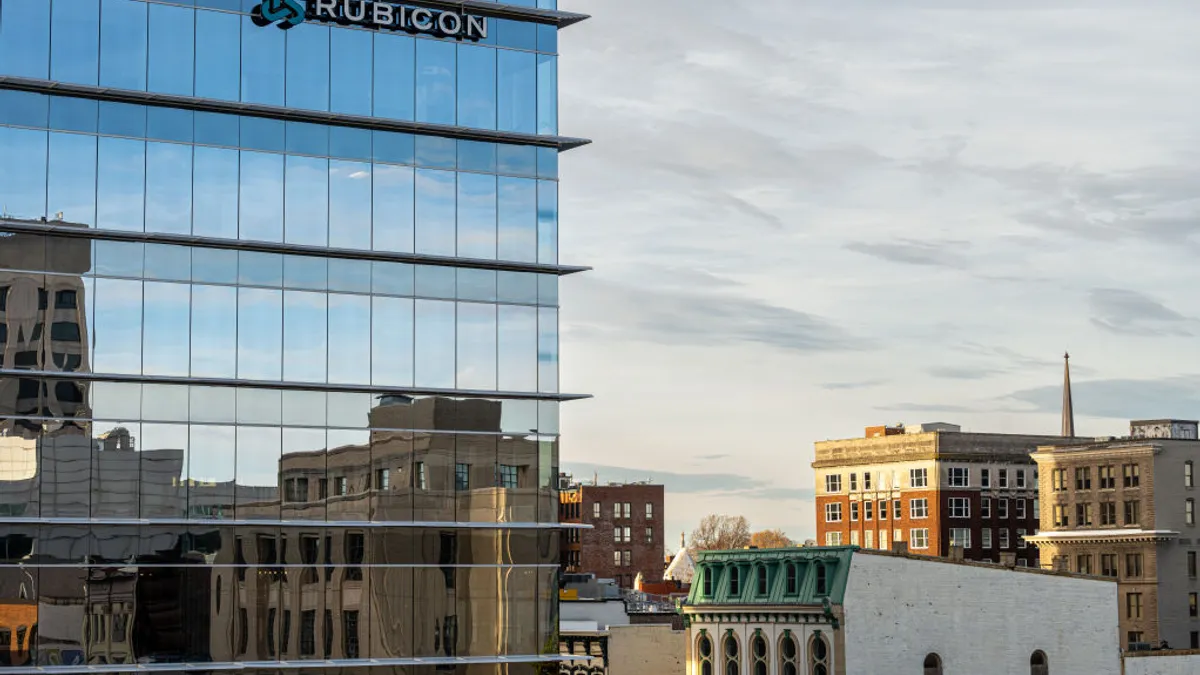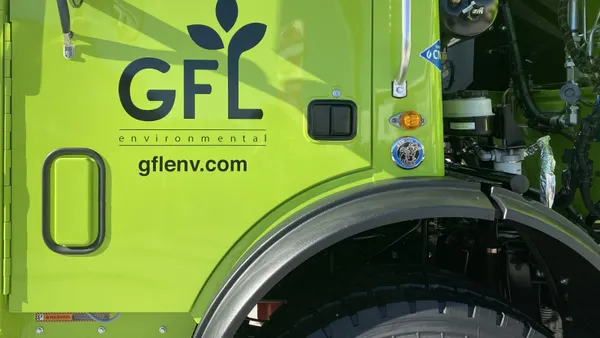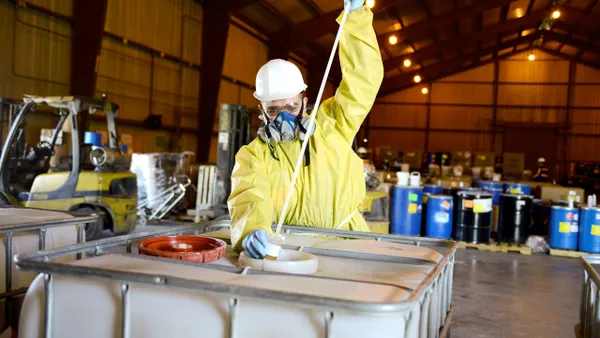Dive Brief:
- Rubicon Technologies has entered into a merger agreement with Founder SPAC, with a pro forma enterprise value of approximately $1.7 billion, as the Wall Street Journal first reported on Thursday morning. The combined company will publicly trade on the New York Stock Exchange as RBT following a deal that is expected to close during the second quarter of 2022, subject to regulatory approval.
- Rubicon anticipates it will hit $577 million in revenue and $45 million in "net revenue" for 2021, according to an investor presentation. It projects overall revenue could reach $1.596 billion by the end of 2024. The company estimates it currently has more than 8,000 customers, 8,000 third-party hauling partners and 8 million service locations in 20 countries.
- "While waste and recycling is a highly resilient category, it is ripe for improvements in efficiency and sustainability," said founder and CEO Nate Morris, who will remain in his role at the Kentucky-based company, in scripted remarks during a Thursday investor call. "Rubicon expects to gain increasing market share because we have a business model that has been purposefully designed for the future of recycling."
Dive Insight:
Founded in 2008, Rubicon has been viewed as part enigma and part threat by many in the traditional U.S. waste and recycling industry. After many years of big projections, the news of its plans to dramatically grow revenue and market share may start to bring rare clarity to what the technology-focused company will really mean for industry competition in years to come.
The company's core approach of providing service to commercial customers via third-party haulers is similar to the common waste broker model, but Rubicon has long eschewed that label and pointed to its broader technology offerings as a differentiation. While the company emphasizes it does not follow the traditional industry model because it does not own any physical assets, investor materials note it also relies on major companies' MRFs and landfills to handle the material its hauling partners collect.
Beyond its collection business, Rubicon's other revenue drivers also now include recyclable commodity sales and software subscription fees. Looking ahead in a five-year plan, the company intends to grow into new markets with international joint ventures and eventually to offer equipment leasing, service for specialty wastes (described as "hazardous, e-waste, medical, portable toilets"), camera technology and more. Its 10-year plan describes "global presence and leadership" in a worldwide market currently estimated to be worth $2.1 trillion. It also envisions "fully enabled autonomous fleets collecting and diverting materials from landfill" by that time.
As the company started to gain scale in recent years, while publicly calling out industry giants in the media and in events such as a memorable 2017 WasteExpo appearance, it soon faced pushback with contentious lawsuits over customer acquisition strategies and other issues. Tough media coverage questioning some of its financial information soon followed, but the company went on to grow with new broker acquisitions in 2018 — including a WestRock division — while also seeing a series of executive leadership changes and other shifts along the way.
By 2019, in a WasteExpo interview, Morris said "there is plenty of waste for us all to build massive companies, and there is plenty of waste for Waste Management and Rubicon to coexist" as the company emphasized its growing software offerings and city partnerships. Last year, as the pandemic hit commercial waste and recycling customers nationwide, Rubicon received a nearly $9.8 million loan from the Paycheck Protection Program (the industry's largest amount in the initial round) that has since been forgiven.
Today, as it announced the new deal, with technology-focused special acquisition corporation Founder, Rubicon and its partners returned to a more characteristically competitive tone when describing future growth potential.
"[W]e are creating a new standard for the waste and recycling category," said Morris. "Historically, waste has been an overlooked issue, but Rubicon exemplifies a different kind of company, one that has sought to address the entrenched shortcomings of the industry and bring the issue of waste into the public consciousness."
Founder CEO Osman Ahmed said in a press release the SPAC's "main thesis" was to "partner with an iconic company enabling digital transformation in a significant end market. We are pleased to have found that partner in Rubicon, who is transforming a multi trillion-dollar industry which has remained essentially unchanged for centuries."
In its investor presentation, Rubicon laid out plans to grow organically while also ramping up acquisition spending. According to recently appointed Chief Financial Officer Jevan Anderson, an estimated 30% of the company's projected net revenue growth comes from existing customers. High-profile names in Rubicon's portfolio include Walmart, Starbucks, Amazon and many more who are said to want enhanced data and service options to meet their own sustainability initiatives. Rubicon also sees a $400 million pipeline of opportunities for contract portfolio acquisitions, and it touted notable results from the five deals it has completed so far.
Rubicon will see an estimated $432 million in proceeds from the deal, prior to transaction costs, that will help fuel growth in both areas. That total comprises $321 million in cash from Founder and a $111 million PIPE (private investment in public equity) backed by Palantir Technologies, the New Zealand Super Fund and Rodina Capital. Existing Rubicon equity holders will see a full rollover of their investments.












